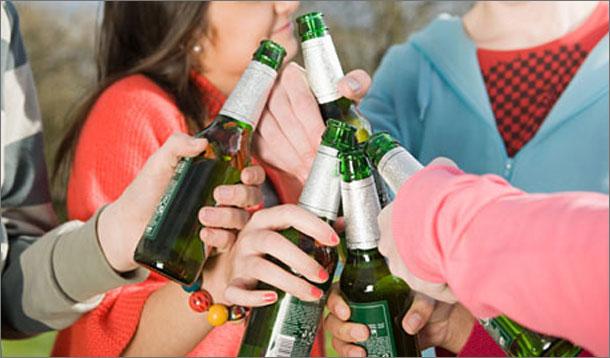
A client reports: my son (he is sixteen) was offered alcohol by his friend’s parents at their house, last weekend. He told me he felt it would have been rude to decline – ha-ha. The friend’s parents believe that since kids are going to drink anyway, they are happy to have their kid and his friends drink in their home where the boys are safe. I guess that makes sense . . . “
On what planet?
Although I consider myself to be a pretty liberally-minded mom, I am shocked and dismayed at the cavalier attitude with which many parents treat their teenagers’ drinking adventures, mistaking enabling for responsibility.
Through the ages, adolescents have tried to get drunk, stay drunk, possibly not remember their drunkenness but rely on the accounts of other equally drunk teenagers to inscribe their experiences third-hand into the Big Book of Adolescent Alcoholic Exploits. Teenagers, begin drinking because they are curious, or to impress their peers, they think it’s a rite of passage and they feel immortal like characters from “Twilight.” They are, however, in the “twilight zone,” their brains dimmed with growing pains and hormones; that is precisely why their parents’ attitudes and behaviours are so crucial at this time.
Last summer, during a cottage holiday, a friend’s 16 year-old son decided to play a drinking game with a group of his buddies who had liberated several bottles of alcohol from their parents’ stash. This boy, I’ll call him Jimmy, was for all intents and purposes, “a good kid.” He did well at school and had lots of friends; he was helpful and respectful of curfews and other family rules. Jimmy was also a high school football player—6’3” and over 200 pounds—big. So big, it didn’t occur to him that something as weightless and clear as vodka, could bring him to his knees or lower. Jimmy downed fifteen vodka shots in a very short period of time. His parents had spoken to him about drinking, but he was on vacation, close to “home,” not driving anywhere and there were girls watching. He thought that because he was big, his body would withstand ingestion of a lot of alcohol. The worst that could happen was that he might become a little bit silly. This presumption was not to be. Jimmy passed out, then began to throw up to the point where he was choking on his own vomit. Thankfully, a loyal friend who had stayed behind with him knew enough to turn Jimmy on his side and ensure he kept breathing. That was, unfortunately, not the last time Jimmy nearly lost his life during this evening. Later, at the hospital, Jimmy’s body was shutting down. His stomach was pumped, he was put on an IV for fluids, unconscious for hours waking up to a worried family and self-mortification. The hospital staff recommended to the boy’s parents that they take photo’s even videos of the experience so he would realize how serious this issue is, how not funny it was and how close he came to dying. I personally know of two teenagers who died last year. One from freezing to death after passing out in a snow bank and one from falling over a guard rail as he stumbled home in a drunken stupor.
Alcohol works directly on the central nervous system and kills more male teenagers and young men than any other drug taken to affect mood and behavior (heroin, cocaine, marijuana). Teenagers are impetuous and disbelieving of their own mortality. This is a lethal combination. Parents who allow other people’s children to drink in their homes are not only irresponsibly risking the safety of those kids but could be setting themselves up for a lifetime of woes, both legal and emotional should someone get hurt or injured. Parents who laugh about their teenagers’ exploits should give their heads a massive shake and treat the subject with the gravity it deserves.
If you have family traditions, such as wine with dinner on weekend nights, and want to include your teenager, that is perfectly fine as long as it is explained and rules regarding drinking in general are communicated. But, setting parameters isn’t enough. Kids need to know in real and ugly terms that they can actually and easily lose their lives—just by one single bad drinking bout. Poisoning does not wait for their brains to catch up to its repercussions. It does not provide a second chance. It can act immediately and tragically.
If you have a teenager who does come home drunk, keep an eye on him of course to ensure that he doesn’t choke or isn’t in any other form of physical distress, but beyond that leave the child. If your son throws up all over the bathroom and then passes out, let him sleep there and wake up covered up in his own mistake. If your daughter is dirty and disheveled and completely unaware of her behaviour make sure she is safe and hydrated but don’t play nursemaid. Don’t cancel events the next day and don’t ease their hangover. Most children can learn a great deal from their mistakes with alcohol. Don’t “fix it” for them. They need to see the consequences of their drinking first-hand, not just hear about how “funny” it was from friends.
Whatever you do, please don’t turn a blind eye. Talk to your kids about how dangerous drinking in excess can be and teach them to stay with a friend who has had too much to drink. Teach them not to be afraid to call their friends parents or an ambulance if a friend has passed out from drinking. Don’t shy away from talking to your kids because doing so is unpleasant and don’t talk yourself into believing that “good kids” don’t drink. They do— – and it can be fatal.